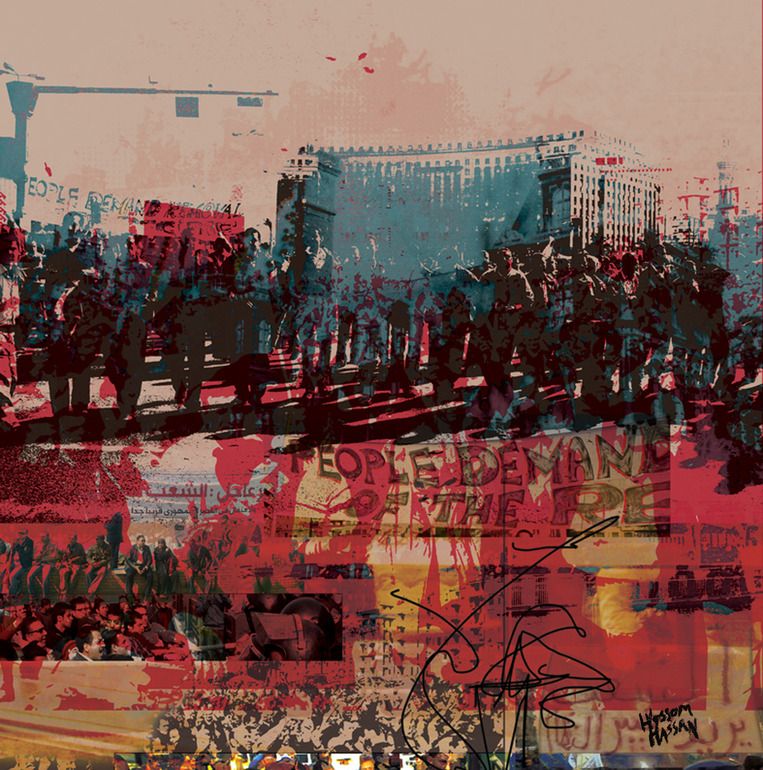The fourth anniversary of the revolution is drawing near. Four years of struggle and fighting have led to a societfalling prey to the clash of the titans, a clash that belongs to the previous century.
The revolution’s dreams and hopes of building a new society have faded away. The past year in Egypt was marred with blood, fear and murder; the two major powers of the society declared a fierce war to eliminate the other, and neither of them would settle for a tie. Meanwhile, the military seems to be starting the new year with more strength than the Muslim Brotherhood: The coup is determined not to fail and the Brotherhood will soon be forgotten.
International and regional cover for authority
There has been a regional conviction that the fall of the regime in Egypt is in no one’s interest. The fact is that no party, except for whatever is left of the country's military leadership, is capable of withstanding the power locus in Egypt. Meanwhile, the situation in Syria, Iraq, Yemen and Libya is degenerating for the worse. In Egypt, Saudi Arabia and the United Arab Emirates are offering unconditional support to President Abdel Fattah al-Sisi’s regime.
Saudi Arabia has several motives to offer such support, most importantly its desire to demonize the idea of revolutions and the possibility of their success in a peaceful manner. Moreover, Saudi Arabia wants to see its political and economic influence stabilized at the regional level. It also has concerns over the situation in its domestic arena. Saudi Arabia also wants to “pay back the favor” to Mubarak, who had been its ally for decades (along with Jordan) in the axis of moderation in the face of the Iranian “axis of evil.” Saudi Arabia's position has not changed much since the first day of the January 25 Revolution of 2011, especially since the last version of Egyptian military rule does not raise fears at the regional level and does not seek to expand.
As for the support of the UAE, it is driven by a desire to acquire a large market to invest in. Even if Egypt does not have a military force with a specified clout, the fact remains that it has power in terms of human capital and numbers that could be useful in the event that the security of the Gulf is subject to a wide and serious risk. This is what Sisi has said he has been getting ready for ever since his ascent to power.
The Muslim Brotherhood organization in Egypt no longer has anything to offer at the regional level; it has been socially, politically and economically exposed, and the military regime has succeeded in destroying and dismantling its infrastructure. Moreover, this regime has successfully exploited the regional turmoil with a security rhetoric that warns people against any move that could turn Egypt into another Syria or Iraq, and that accepting a great deal of oppression and tyranny is much better than being in the midst of a civil war and the threat of terrorism.
Employing similar rhetoric, the regime is using the domestic threat in referring to its war in the Sinai against the Ansar Bayt al-Maqdes organization. This war’s repercussions are intermittently witnessed by Al-Wadi residents in the governorates of Cairo and the Nile Delta.
Exposure of the Brotherhood
The Muslim Brotherhood leadership has crumbled away and things are in the hands of smaller and less efficient groups that are not happy about the situation, either inside or outside the organization. These groups are driven by anger, bitterness and anguish at the loss of everything, including their friends and the authority that the Brotherhood wasted with its uncalculated adventures. The Brotherhood has neither weapons nor large numbers that can make a social or political difference. It does not seriously control any geographical area through which it can carry out radical maneuvers against authority.
This is because there are some Islamists who are more radical than the Brotherhood itself, who had the opportunity over long years to establish commercial and social networks.
Many reasons suggest that the organization is exposed militarily, politically and in terms of security and popularity. ... As for the United States, there is no real conflict of interest with Egypt’s army.
The US was banking on either the Brotherhood or the army and both of them are presenting themselves as a reliable strategic allies to Washington, supporting the big headlines of its strategy in the region.
The issue of the Muslim Brotherhood in Egypt is no longer a major concern for international powers. The international community is preoccupied with the fight against the Islamic State (IS), which managed to open a front stretching from Syria to Iraq and is attracting large numbers of angry young people in the region.
IS has everything: women, the sense of manhood, virility and humanity derived from fighting, control and power, not to mention a community with a cause — regardless of the value or lack of such a cause — in addition to the military uniform and the euphoria of victory.
By contrast, the Muslim Brotherhood had all of that and is no longer a threat to the regime in Egypt.
Since June 30 [2013], one can say that a large segment of the people have been supporting the power center, in the sense that they were demanding a further clampdown on the Brotherhood and they have gone as far as to take part in oppressive campaigns themselves.
The Friday [Nov. 28] Islamic identity demonstration: The authority couldn’t have wished for better
What made matters worse was the “million-man protest” to proclaim Egypt’s “Islamic Unity” that took place on Nov. 28, which was organized by Salafists of the Islamic movement without the Salafist Nour Party and was endorsed by the Brotherhood. At the time, a video showing “Muslim masses that went to the street to support Islam” went viral on the social networking sites.
The video created a state of consensus between the Brotherhood and young Salafists who called for this protest, which included many contradictory and contrasting parties, remnants of the previous regime, revolutionaries of all stripes, people espousing different forms of the Islamic concept with all its aspects and forms (such as the movement of Abdel Moneim Aboul Fotouh, the leader of the Strong Egypt Party, and his ilk).
The call dismayed a large sector of nonpoliticized people in many common and bourgeois areas alike, as the mobilization objectives were no longer well defined and it was futile to drag the country down into a deep pit. This was happening against the backdrop of a crackdown on people in general and the volatile demonstrations of the Brotherhood, which led to further disorder and violence in many neighborhoods.
There is no doubt that rumors and speculation have played a big role, as some predicted an unprecedented wave of violence. These expectations were further fueled by the statements of the Ministry of Interior, which threatened to destroy the Brotherhood because the ministry would not tolerate Brotherhood terrorism. A group of the Islamic movement called it the “Red Friday million-man march,” saying it would witness battles that would “shake the coup and be the start of an Islamic revolution to topple the military regime and uphold the word of God in Egypt.”
By contrast, state and private media outlets began a fierce campaign demonizing [the Brotherhood] after Friday [Nov. 28], and succeeded in magnifying the panic that had existed since a call for a protest was made which promoted more hatred toward the Brotherhood. The authority called on the public not to interfere and to stay away, and deployed its forces in the squares and streets in an unprecedented way. Informants were deployed across the city and a state of high security and military alert was imposed in the country. Then the "event" took place, with a complete absence of support.
Outside the perimeter of Cairo’s Matariya district nothing worth mentioning took place. The Muslim masses did not revolt in support for the religion of God and it seems that the identity was wandering alone in the empty streets. Thus, the Muslim Brotherhood and their allies did the security forces and apparatus a great service. This has prompted some to openly question the wisdom of those who have made the call and to ridicule them, by saying: “If the people were working for the security forces, they would not have done that.” Had those who made the call been following the rules on “how to rebuild the security system at the psychological and strategic levels as well as on the ground and how to serve the security to achieve two goals with a single step,” they could not have done better.
An unprecedented success was recorded by the authority and security forces on that day in displaying the tools of oppression and the capability of control. It is a sort of training on a quality maneuver to counter the masses, on fast deployment and positioning, raising moral and mental efficiency, enhancing the regime’s ability in its security discourse with the community, reproducing panic and risks and using the danger, thwarting the possibility of linking social and economic demands to political freedoms and promoting and consolidating the idea that Sisi and the army are the savior, which the authority would not have dreamed of.
The most dangerous part is that this call came one day before the trial of Mubarak, Habib al-Adly and several of the Interior Ministry’s former leaders. Despite the general distress and resentment toward the ruling acquitting Mubarak and his aides, society was more tired, angry and fearful of the Muslim Brotherhood and the large militarization in the country. The authority and its security forces succeeded in achieving two goals in a single strike. The protests on Friday for Egypt's “Islamic identity” failed on the one hand, and the opportunity to crack down on any possible movement after Mubarak was acquitted was taken advantage of on the other. A number of local political activists, analysts and researchers such as Amr Abdel-Rahman (of The Bread and Freedom Party), a political science professor and political activist, believe that the Muslim Brotherhood has become an obstacle for any significant action in the community.
The group is trying to exploit the anniversary in order to unify the revolutionary ranks and repeat the experiment of the January 25 Revolution. There are negotiations and many talks on the importance of coordinating, overcoming differences and uniting against the military authority and reviving the spirit of the squares once again. Some argue that the Brotherhood's strength cannot be dispensed with, especially if the group goes beyond the demands for “legitimacy” and “the return of Morsi.” This is while a large segment of the revolutionaries insists on considering the Brotherhood as part of the counterrevolution, under the slogan of “Down with the military, the remnants, and the Muslim Brotherhood.” A larger part of the community view the Brotherhood as being more dangerous than the Mubarak regime itself. This is the case on the eve of the fourth anniversary of the January 25 Revolution.
Translated by: Al-Monitor







